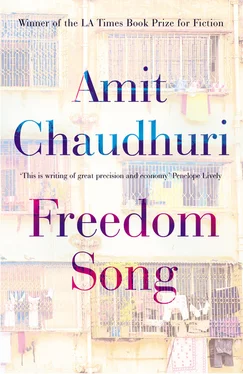‘I saw you devour those sweets,’ said his mother, ‘you can never resist them’; but that night, when he ate very little at the dining-table, there was palpably some other reason for his loss of appetite.
‘What did you think of her?’
His mother put this question to him a few days later, deliberately absent-minded, as if she were questioning the air. A mongrel’s bark followed the silence.
She had this evasive way of putting things. Bhaskar knew the question did not need to be answered; that it was a way of postponing what was to and must happen.
‘Um,’ he said.
Sometimes, when she and Piyu stood together, they, though unconscious of the fact, almost looked as if they came from different families. Piyu was fair; her eyes and forehead were larger than her mother’s; but her mother’s nose was thinner, sharper, like something she had kept to herself — Piyu’s ended in a sort of pleasant, slightly extroverted roundness; light and shade, the future and past, a family’s destiny and its inescapable inevitabilities and individualities played around their features, as fate often lights up the moment of a photograph. Manik’s face was dominated by his father’s, not so much by his features as by the vestiges of his personality. Only with Bhaskar, of whom she was now asking this question, was there a noticeable, fragile similarity of appearance.
Winter was about to end now. The trees were in leaf. The winter had made it seem possible that loud choruses and a few clenched fists raised together in the air would delay, perhaps even permanently remove, the prospect of liberalization; would punish the fundamentalists. But as time passed, distractions arose; as February approached March members of the band of players began to drift apart; one person had passed his medical entrance examination; another had got a job; the more serious of the members got more involved in professional theatre and joined professional theatre troupes; the small band broke up.
Now, instructions were issued at the local unit of the Party that cadres must get down to other business: assessing the needs of the locality; assessing its problems; preparing slowly for the next local elections. Whenever Bhaskar thought he would go for a rehearsal he was pressed by some senior cadre to attend a more pressing matter at hand. The streets that used to see the erratic and unexpected outbreak of street-plays were temporarily quieter and bereft of their message, at least as far as one group was concerned. There was also a contradictory rumour in circulation these days that the ‘higher-ups’ in the Party had, in secret conferences, been forced to reconsider their attitude to liberalization and that at the source of this change was the highest authority himself; reluctantly they began thinking about China on the one hand and Russia on the other.
And the large damp white quilt that had been taken out from a cupboard in the second storey in Vidyasagar Road every November was now, as it grew warmer, folded and laid to rest on the shelf it stayed on in darkness for the rest of the year.
When Mini returned home in the afternoon she found Shantidi in bed in a somewhat odd position, while Anjali the maidservant was sitting and fanning her, shaking her head. As she had come to the staircase she had encountered the familiar damp silence, almost a presence, unkindled by sunlight, but as she had climbed she had sensed subtle signs of disorder she could not quite identify.
‘She fell down the stairs, mashima,’ she said. ‘I had to help her upstairs.’
‘But how did you fall?’ asked Mini.
Shantidi had slipped two months ago when getting down from a rickshaw in a lane near Chitpur Road but hadn’t seriously hurt herself.
‘There was something on the stairs,’ muttered Shantidi. ‘I think it was water. .’ Later, she fell asleep.
I knew this would happen, thought Mini.
Mini thought of the dark stairs and of Shantidi always hurrying, hurrying, towards an unspecified destination.
Next day the pain remained; she woke up with it, found it difficult to move. The pain, just above the thigh and below the hip, distracted Shantidi, but the drama of the situation appeared to amuse her. The drama almost anaesthetized the pain. But soon she grew impatient with her circumscribed condition and struggled briefly with herself, with undescribable movements, because she wanted to resume the daily routine with which she occupied herself, but whose nature very little was really known about. Mini propped her up on the bed and gave her a cup of tea and a Marie biscuit which she dipped cautiously in the tea for it to become soft and red.
It was the flat really, or perhaps just her nature: she could not stand being in one place for too long.
Later, Dr Chakrabarty came and said it could quite possibly be a fracture and that an X-ray would have to be taken.
‘Will I have to go to hospital?’ said Shantidi. She was like a child about to be shown a new place.
‘I think so,’ said Dr Chakrabarty. ‘Is there no one to help?’
Two sweepers were hired, to their reluctance, from the building (but made more eager by a promise of twenty rupees), to put Shantidi into a chair and then carry her downstairs into a taxi. The two men in khaki shorts proceeded delicately, their knees trembling with the strain, while Shantidi gripped the chair with both hands; and Mini waited to take out twenty rupees from her purse.
That month was spent in journeys to an X-ray clinic, a small hospital with a garden not far away, and in bed rest in the house. Shantidi had taken the chaos almost jubilantly; then, as naturally and inevitably as a seasonal moon passing into a different phase, but unnoticed, she slipped into a deep depression. Mini did not sense it; all her life, Shantidi had been excitable, easily irritable, but intrinsically detached from the frustrations of existence.
She’d retired fifteen years ago for, it appeared to Mini, no good reason. While Mini went to school, Shantidi travelled around most of Calcutta and did not restrict herself to the North. She would turn up at the most unexpected time of the day at people’s houses. She’d sat in buses and looked at the workers on Central Avenue and Chowringhee; she’d dozed in traffic jams. Sometimes it was because she had an impulse to see someone; sometimes some child had passed an exam. This was what her early seventies had been like, a simple time of unimpeded, almost incorporeal, mobility.
One day, she said to Mini:
‘You’re going through a lot of trouble because of my accident.’
‘What do you mean?’ said Mini, keeping her exercise books on the table. ‘I’m going through a lot of trouble!’
Then, another day, she said:
‘Who’s going to look after us, Mini?’
Mini sighed. ‘Who’s looked after us so far?’ she said. ‘If you look at the way some other people. .’
‘But things don’t always stay. .’
‘What is it you’re trying to say?’ said Mini. ‘If we have problems,’ she said very practically, ‘we’ll have to see about them when they come.’
She stayed in school till the afternoon.
‘It must be very hot outside,’ said Shantidi, ten minutes after Mini had come back. For the door to the small balcony had been shut to protect the room from the heat.
‘It is hot,’ agreed Mini.
‘You must be working very hard, Mini,’ said Shantidi. ‘Especially after I fell.’
‘What nonsense!’
Sometimes Mini would come back from standing in a queue at the bank, or from the market, and find Shantidi staring, as if she had quite forgotten the numberless tiny routines that made up each day and each week, and as if the world had ceased to exist outside the parameters of her home. Mini counted silently the years since her elder sister had retired, and then how many years it had been since she’d had that liver problem — three — but could come up with no solution. A few days later Shantidi observed, ‘I’ve become a burden on you, Mini.’ ‘In what way?’ Shantidi looked at Mini reproachfully, as if she’d been deceived. ‘Because I do nothing. And now I’ve been laid up in bed,’ she said. ‘You have to work for both of us, and you’re not even well. It would be easier for you, I think, without me,’ she said.
Читать дальше












